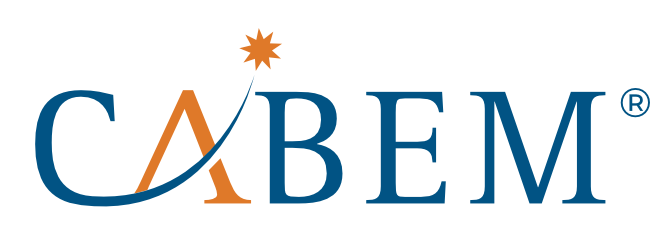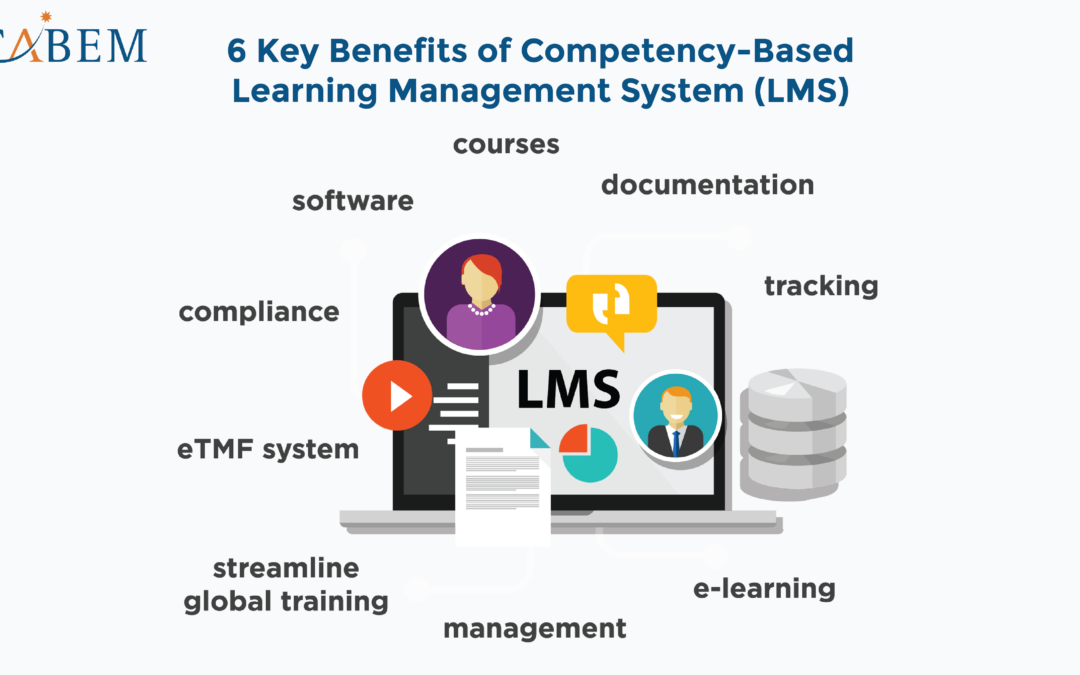The demand for more flexible and personalized education and training is increasing daily. Traditional educational methods are ineffective in facilitating customized learning and preparing individuals for the job market.
This is where a Competency-Based Learning Management System (LMS) is a perfect fit. It goes beyond the mere idea of completing a course and boosts learners’ competencies instead.
That is why, in this article, we will concentrate on the primary advantages of Competency-Based LMS. If you want to know how competency-based LMS differs from traditional systems or how the latter is helpful for various industries, it may be worthwhile to read this guide to the end to find all the answers to your questions.
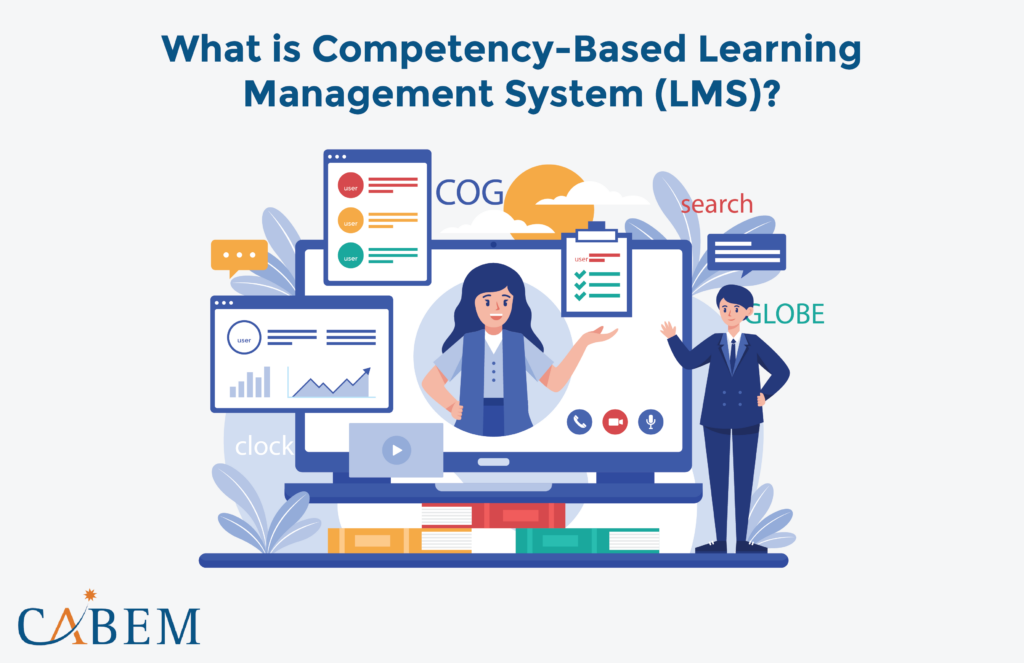
What is a Competency-Based Learning Management System (LMS)?
CABEM’s Competency-Based Learning Management System (LMS) is designed to facilitate learning and development in various scenarios. It focuses on the mastery of specific skills or competencies of learners during some training and education.
In contrast to the conventional learning systems where learning duration is key, a Competency-Based LMS focuses on acquiring certain competencies before the learner can proceed to the next level of learning, education, or training.
Competency-based LMSs are designed with easy-to-understand and measurable competencies that any learner is expected to acquire. Such competencies can be related to the organization’s objectives or an educational establishment and correspond to individual learning needs.
The system features flexible progress. It allows learners to study at their own pace and extend more time to work on the difficult parts.
Competency-based LMS ultimately ensures that learners are fully prepared for real-world challenges by the end of their training.
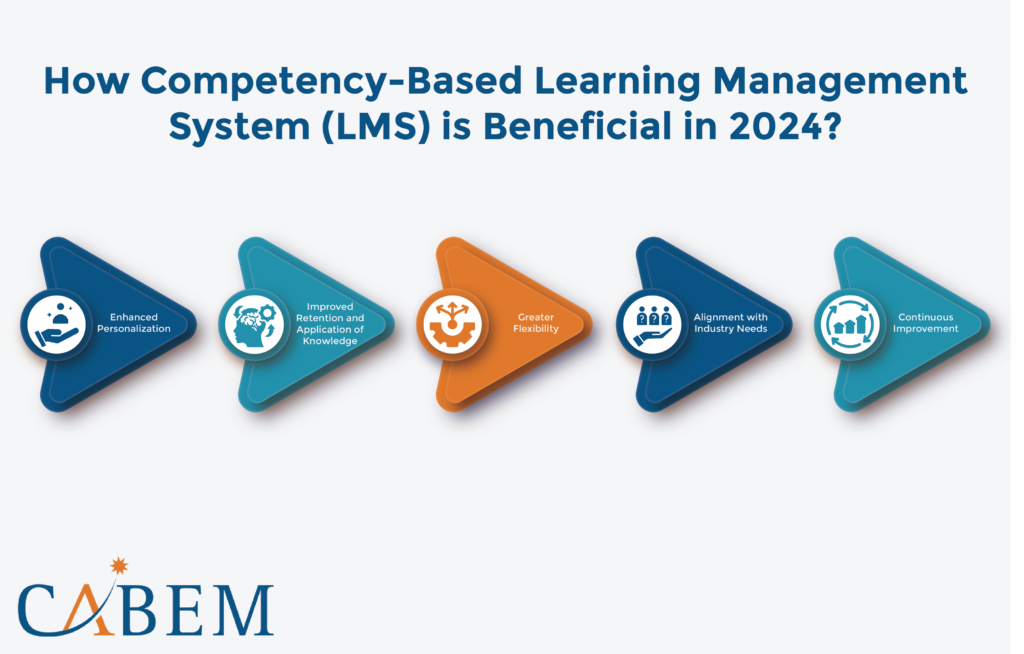
How a Competency-Based Learning Management System (LMS) is Beneficial in 2024?
The demand for personalized and efficient learning solutions will continue to grow in 2024. Competency-based LMSs are especially helpful in this regard. Unlike traditional educational models, they focus more on the desired learning outcomes.
The advantages of these systems are quickly manifesting themselves in different industries. These systems become necessary for organizations that want to remain competitive and relevant in the market.
1. Enhanced Personalization
Competency-based LMSs are tailored to meet individual learner needs. Depending on the circumstances and responsibilities of the learners, they can pay close attention to the particular competencies necessary for their positions.
2. Improved Retention and Application of Knowledge
It focuses on learners mastering specific skills. Therefore, learners are more likely to acquire, comprehend, and use knowledge since they master specific skills. This leads to better course outcomes and, hence, a higher return on the investment made in training.
- Bill & Melinda Gates and the Competency-Based Education Network (C-BEN) conducted separate studies. They found that Competency-Based LMS is very useful in preparing trainees and students for the job market because its main focus is skills and competencies rather than time-based metrics.
3. Greater Flexibility
Competency-based LMSs allow flexibility in terms of time and location. Learners can access training materials at their convenience, making it easier for them to balance learning with other commitments.
4. Alignment with Industry Needs
These systems are designed to align with different industries’ specific needs. It ensures that learners acquire the relevant skills that are most in demand.
5. Continuous Improvement
Competency-based LMSs enable continuous feedback and assessment. It allows learners to identify areas for improvement. It also tracks their progress over time.
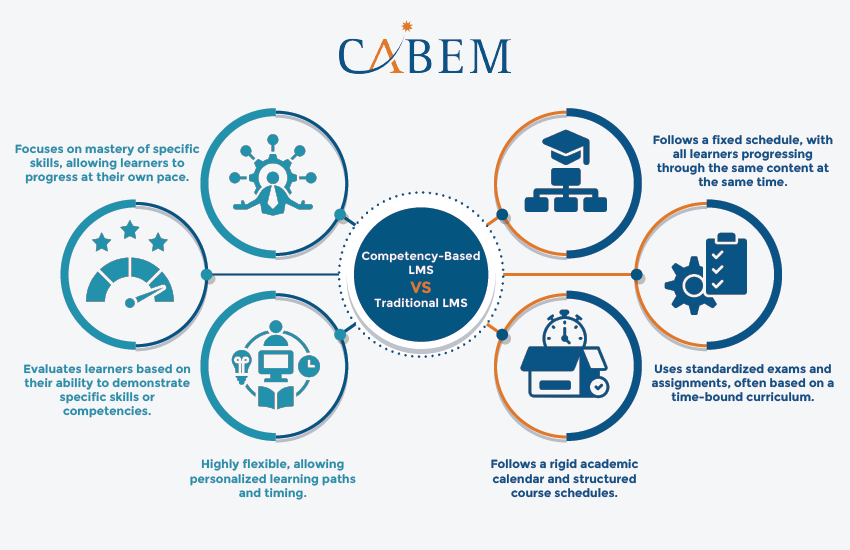
Competency-Based LMS Vs. Traditional LMS
A comparison of Competency-Based LMSs with traditional LMSs presents many differences. As has been identified, traditional LMSs are designed mainly for the notion of ‘learning’ completion and gaining credits.
On the other hand, Competency-Based LMS emphasizes the possible methods of providing proof for particular competencies.
The following table highlights the key differences, along with the pros and cons of each approach:
| Feature | Competency-Based LMS | Traditional LMS |
| Focus | Mastery of specific competencies | Completion of courses |
| Pacing | Flexible, self-paced | Fixed schedule |
| Assessment | Continuous, based on real-world application | Periodic exams and quizzes |
| Feedback | Ongoing, personalized feedback | Limited to course-end or mid-term assessments |
| Flexibility | High-adaptable to individual needs | Low, one-size-fits-all approach |
| Pros | Personalized learning, improved skill retention, real-world application | Structured learning path, easy to manage large groups |
| Cons | Requires more effort in setup and ongoing management, may need more advanced tracking tools | May not address individual learner needs, with less focus on skill application. |
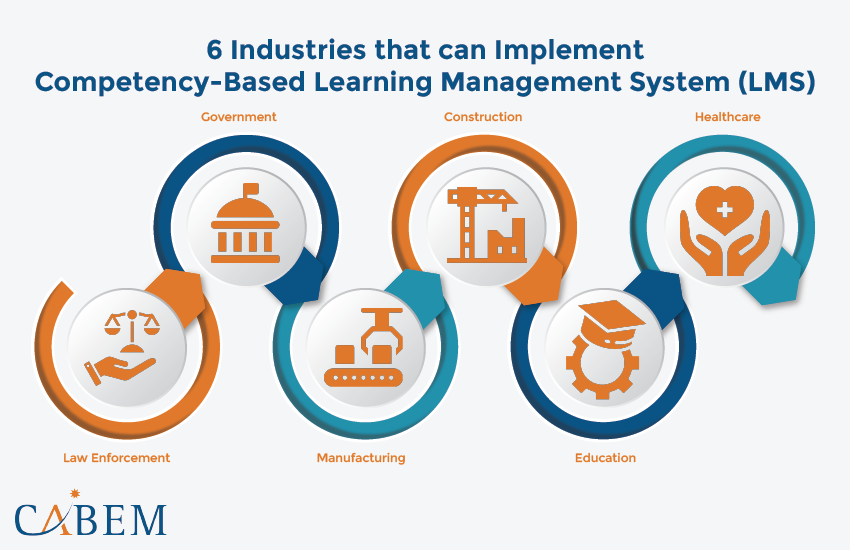
6 Industries that can Implement Competency-Based Learning Management System (LMS)
Competency-based LMSs are generally very flexible. Due to their designed structure, they can be used in almost any industry.
Here are six key industries where these systems can have a significant impact:
1. Law Enforcement
A Competency-Based LMS can enable law enforcement agencies to impart competencies, including conflict-solving skills, legal knowledge, and tactical prowess among officers.
2. Government
Government agencies want their employees to have a wide range of workplace abilities. Competency-based LMSs could assist those organizations to guarantee that the workforce is developed adequately to meet the organizational needs.
3. Manufacturing
In manufacturing firms, it is essential to show one’s competence with certain activities. Competency-based LMSs remain important to workers’ training and development process to attain the technical competencies required to operate machines and other equipment, perform product inspections, and perform other tasks.
4. Construction
Construction projects must have qualified employees who are capable of undertaking several activities, such as reading construction plans and blueprints and following safety measures. Competency-based LMSs can assist managers with accurately identifying whether workers are proficient enough in performing specific tasks.
5. Education
Educators can use Competency-based LMSs to track students’ progress. It ensures that they have achieved. The relevant competencies before they are exposed to more challenging topics or activities.
6. Healthcare
The healthcare industry demands qualified employees experienced in different fields, from caring for patients to performing various operations. Competency-based LMSs can be beneficial to healthcare providers by making sure that everyone within the organization is competent enough to practice in any field that is required.
For more detailed insights, consider reading our guide, “Top 6 Industries That Benefit from Competency Management Software”
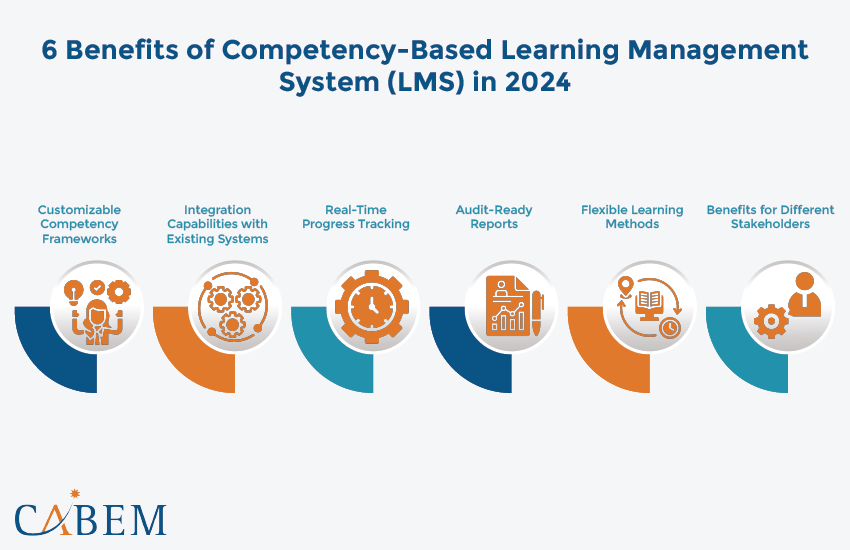
6 Benefits of Competency-Based Learning Management System (LMS) in 2024
Competency-based LMSs are beneficial in 2024 as they provide various features essential for enhancing the learning process of organizations across different industries. Here are six key benefits:
1. Customizable Competency Frameworks
Competency-based LMSs enable one to design a competency model according to the organization’s needs. This helps ensure that learners learn the most relevant skills to perform their tasks.
2. Integration Capabilities with Existing Systems
These systems can be linked to other existing HR and training applications, thus simplifying the process of monitoring learners’ progress and the administration and control of training exercises. Interface competencies guarantee that Competency-Based LMS is integrated with the other tools, minimizing the workload.
3. Real-Time Progress Tracking
Competency-Based Learning Management System can monitor learners’ progress in real-time and help organizations manage the skills gap. This feature is crucial for those organizations and industries in which up-to-date training skills are essential.
- Studies conducted by the Competency-Based Education Network suggest that real-time tracking could enhance training performance by as much as 25% (Competency-Based Education Network, 2023).
4. Audit-Ready Reports
The capability to create detailed and audit-ready reports is a great value that brings competitive advantages to companies from highly regulated sectors. Competency-based LMSs allow the production of documentation that meets the set industry standards without many complications.
5. Flexible Learning Methods
Competency-based LMSs can accommodate different types of learning. It includes online classes, workshops, hands-on training sessions, etc. This flexibility lets organizations design a more compelling learning environment for their staff.
6. Benefits for Different Stakeholders
Competency-based LMSs are advantageous for all the stakeholders involved in the learning process in some way. It provides learners with a more effective learning process. As a result, it helps organizations to attain a more competent pool of employees.
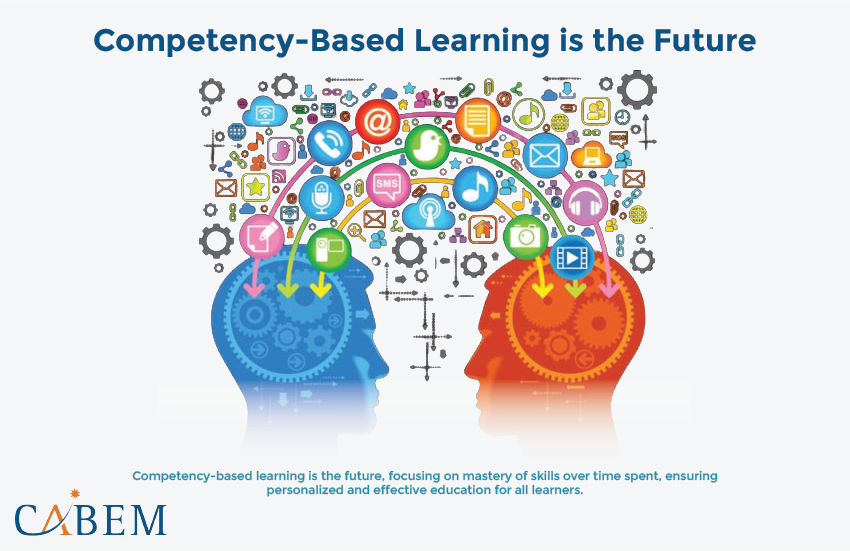
Bridging the Gap: Why Competency-Based Learning is the Future
Industries are evolving continuously, which increases the need for a more specific and effective approach to education and training. Competency-based LMSs provide an effective solution that can respond to the expectations of the modern learner and equip them for future learning experiences.
The design of these systems ensures mastery of specific skills and competencies, guaranteeing that learners are well-prepared for their respective realms.
As we advance deeper into 2024, it is evident that CABEM’s Competencies-Based LMSs hold a critical position in the future of learning.
However, if you want to harness the full benefits of Competency-Based Learning, we can provide an improved LMS that suits your needs.
Request a demo today and witness how our CABEM’s Competency-Base Learning Management System can revolutionize your training programs, manage competencies, and improve efficacy.
Contact CABEM today to take a step towards a better future with enhanced efficiency in your organization.
FAQs
What is the difference between Competency-Based LMS and Traditional LMS?
Competency-based LMSs target the development of specific competencies in learners. They are free to progress at their own pace and are regularly tested. On the other hand, traditional LMSs consider the time it takes to complete a course.
Can I integrate CABEM’s Competency-Based LMS with my existing system?
Yes, CABEM’s Competency-Based LMS is customizable and integrates with your current HR and training software to efficiently monitor the learner’s progress.
What industries can benefit from competency-based LMS?
Competency-based LMS can benefit industries such as law enforcement, government, manufacturing, construction, education, and healthcare. It helps ensure that workers acquire the necessary skills for their roles.
